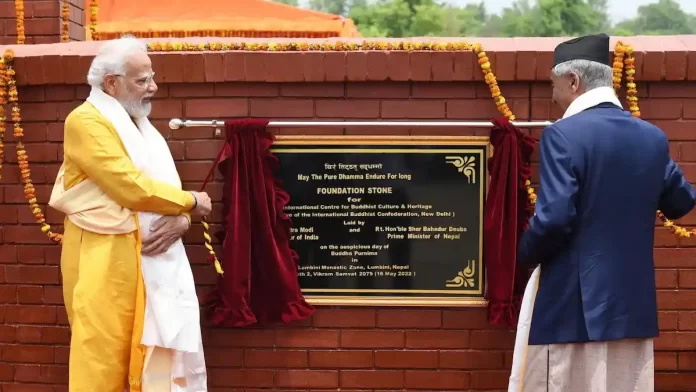Prime Minister Narendra Modi on Monday performed the shilanyaas ceremony for the construction of the India International Centre for Buddhist Culture and Heritage in the Lumbini Monastic Zone, Lumbini, Nepal.
The event coincided with his official visit to Lumbini on 16 May 2022 on the occasion of Vaishakha Buddha Purnima.
Visit to the Sacred Mayadevi Temple
At Lumbini, Prime Minister also visited the sacred Mayadevi temple and offered prayers there. He was accompanied by the Prime Minister of Nepal Sher Bahadur Deuba and his spouse Dr. Arzu Rana Deuba.
The Leaders paid their respects at the Marker Stone inside the temple premises, which pinpoints the exact birth spot of Lord Buddha. They attended the pooja conducted as per Buddhist rituals.
The two Prime Ministers also lit lamps near the Ashoka Pillar located adjacent to the temple.
The pillar, which was erected by Emperor Ashoka in 249 BC, bears the first epigraphic evidence of Lumbini being the birthplace of Lord Buddha.
Thereafter, the two Prime Ministers watered the Bodhi tree sapling from Bodh Gaya which was gifted by PM Modi to Lumbini in 2014, and also signed the temple’s visitor’s book.
Later, Prime Minister Modi delivered an address at a Buddha Jayanti event organized by the Lumbini Development Trust under the aegis of the Government of Nepal.
India International Centre for Buddhist Culture and Heritage
The construction of the unique ‘India International Centre for Buddhist Culture and Heritage’ with a universal appeal will be undertaken by the International Buddhist Confederation (IBC), India under the auspices of the Lumbini Development Trust with the financial support of the Ministry of Culture, Government of India.
International Buddhist Confederation is a grantee body under the Ministry of Culture. The Buddhist Centre will be the first ‘Net Zero Emission’ building in Nepal.
Also, on occasion, the Ministry of Culture in collaboration with the International Buddhist Confederation (IBC) hosted a colorful program for the Vaishakha Buddha Purnima Divas celebrations in New Delhi.
A film was also screened highlighting Prime Minister Narendra Modi’s foundation-stone laying ceremony, earlier in the day for the Centre for Buddhist Culture and Heritage at Lumbini, Nepal.
The event started at 2:00 pm with Chanting from various Buddhist sites playing on the screen.
The Chief Guest, for the event, was Kiren Rijiju, Minister of Law and Justice, Government of India, while the Guest of Honour was Shri G. Kishan Reddy, Minister for Culture, Tourism, and DoNER, Government of India with Shri Arjun Ram Meghwal, Minister of State for Culture as special guest.
Significance of Buddha Purnima
The significance of the timing of the Prime Minister’s visit to Nepal coincided with the inauguration of the Lumbini Buddhist Centre with the Holy Vaishakha Buddha Purnima Divas.
The day is recognized as the thrice blessed day that marks the Birth, Enlightenment, and Mahaparinirvana of Gautam Buddha.
While Buddha was born in Lumbini in Nepal, he attained enlightenment in Bodhgaya in Bihar, preached his first sermon at Sarnath, and attained Nirvana in Kushinagar, in Uttar Pradesh.
Importance of Lumbini in Buddhism
According to Buddhist tradition, Lumbini is the holy place where Queen Mahamayadevi gave birth to Siddhartha Gautama at around 623 B.C.
Gautam Buddha was born in the famous gardens of Lumbini, which soon became a place of pilgrimage.
Among the pilgrims was the Indian emperor Ashoka, who erected one of his commemorative pillars there.
The site is now being developed as a Buddhist pilgrimage center, where the archaeological remains associated with the birth of the Gautam Buddha form a central feature.
Some of the other Viharas and Monasteries in the area are Myanmar’s Golden Temple, Tara Foundation Temple, the Sri Lanka Monastery, the Korean Temple (Dae Sung Shakya), the Cambodian Monastery, and the Vietnamese Phat Quoc Tu Temple.
Lumbini is one of the holiest and most important places in Nepal as a result of which it was included in the list of World Heritage areas by UNESCO.
International Buddhist Confederation
The International Buddhist Confederation (IBC), India- with its headquarters in New Delhi, was formed in 2013 as an international Buddhist umbrella body to serve as a common platform for Buddhists worldwide.
It has the honor of being instituted under the patronage of the Supreme Buddhist religious hierarchy.
The aim is to create a platform for various Buddhist organizations and traditions worldwide to preserve, propagate and promote shared Buddhist values and principles. The objective is also to find shared solutions to global problems.
The IBC has been actively involved in engaging Buddhist organizations in Nepal and has a strong relationship with several senior Buddhist monks.
The Prime Minister’s visit and the building of an Indian Centre within the Lumbini Monastic complex will further strengthen the bonds through a shared Buddhist heritage and legacy.
